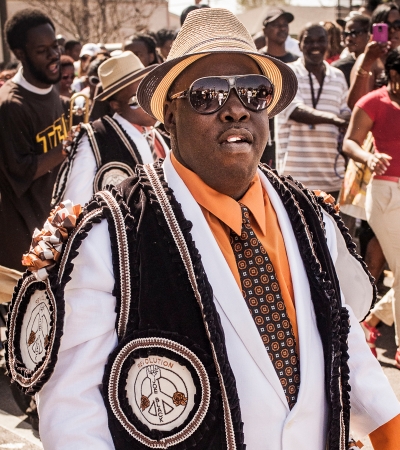Everybody who been parading and going to second lines looks out for the best interest of everyone else. We’re on the same page, trying to make sure that everybody’s okay. When I go out there, me, I observe the king and queen, I observe the groups. You don’t have to spend money, you just got to put it together right. I’m looking at if they took their time or rushed it.
I was born and raised in Desire Project. It was one of the biggest in the nation. The apartments were built around courtyards. I’m all for Benefit—the best street in the project. I really miss it. A group of guys got together out of this court and played some sports against the other court. It was a great learning experience. My man, Michael “Disco” Valdery, we ran together all our lives. We ate at each other’s mother’s tables. We ain’t had to knock on the door, we can just walk in. When my mother left to do housekeeping, my grandmother looked after us. She was like a lot of older people who would keep up with us—tell us what to do and what not to do. When the Black Panthers were in the Desire, I was in school. When the police showed up, the school shut down, pulling us aside to make sure they protected us from anything happening. We also had the outside influence, and that was tough. There were a lot of shootings in the area, so it was best that the people went out to the second line instead of having one in there.
In the early 1970s, the Bucket Men were parading downtown, and the Bucket Men was real huge. Jerome “Big Duck” Smith really held his ground with Tamborine and Fan. Any problem that comes through, I still go to him to handle it. He’ll go to City Hall and get things straight. Wardell Lewis and Fagan, who was from the project, too, decided they should start a parade uptown—the Scene Highlight. That’s the group that turned into the Scene Boosters. It had five divisions, including one kids’ division. The guy my mother used to go with, Ernest Blancher, had a division in the Scene Highlight, and brought me in.
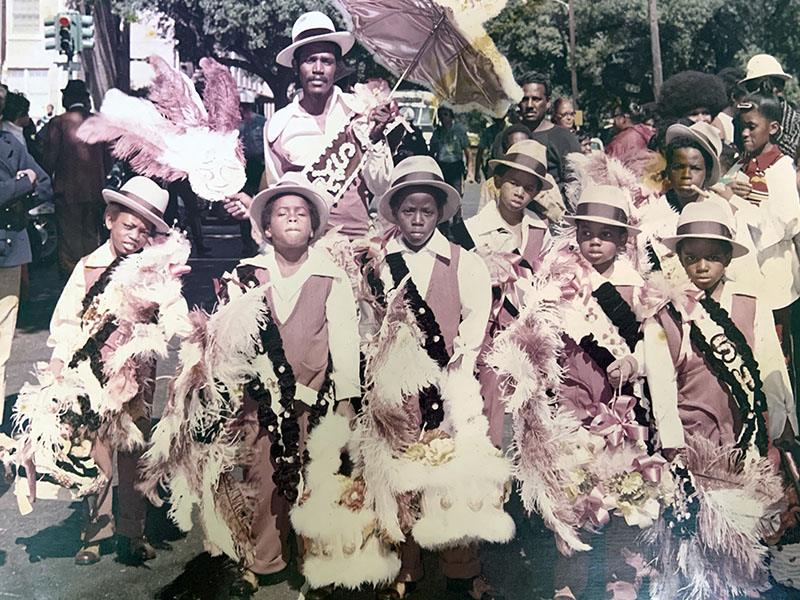
The Scene Highlight’s route started at Shakespeare Park, went down to Martin Luther King, turned left to Claiborne, went down to Jackson to St. Charles, back down to Washington to Baronne to Louisiana until LaSalle and came on down and ended at Kemp’s. The Scene Highlight was a hell of a group. Nobody wasn’t parading from the Ninth Ward, but they saw me, and they made me get to know more and more people. I had a real good time with them even though they didn’t last long. The Scene Boosters took over, and all of the older guys just went by their side. I stayed one more year. I stopped parading when I got more involved in football, but I still loved to dance.
When we were in high school, Disco and I used to ride our bikes up to the Glass House on Saratoga from the Desire. Every week, they were waiting on us. Once we get in there, we go at it with the Dirty Dozen. We used to go up against Eddie “Sugar Slim” Durrell, and this guy, Charles Smith. Waldorf “Gip” Gibson was sitting down. He didn’t come on the floor because—I ain’t bragging—we was nothin nice. We were built just to dance. The guys from Uptown started betting cash money on us.
In 1988, when I was 26, my mom, grandmother, and sister moved to Laharpe in the Seventh Ward. We needed to get a bigger place, but I was still hanging down there in the midst of Desire. It felt more of a family in the Ninth Ward. Disco and I still hung at the Glass House. By then, Gip had the Furious Five. I told him, “Me and Disco are gonna come over with y’all.” Man, he got so excited, telling everybody.
The Five was real major, and they had dancers. We didn’t care about the outfits because we were putting on a show. What can I say about Gip? He really, really cares about people. He puts on a parade where everybody can make it. It doesn’t take a lot of money to parade with the Five. That’s not what the Revolution do—we’re coming out with 1000-dollar outfits. Well, that’s not Gip. Derrick “Eyes” Washington, from the Calliope, joined a few years after. We became close because we loved the way danced—we jammed. He got a great spin. He decided to come with the Revolution and brought people into the Revolution.
I stayed with Gip for five years. I learned from him that even if you are the founder, you don’t run the parade. We make decisions together as a group—put it on the floor and everybody have a say so on it. I told Norman Dixon Jr. that we were going to parade with the Fourth Division—the Untouchables—one year, because he was more dressing on the level that I liked, but it never happened because I decided to leave to start the Revolution. I told Gip, “I’m gonna honor you as my first king. It will show the respect that I have for you. I’m not leaving on bad terms. I just want to do something different.”
We came out with the Revolution in 1995. It signified a change. I didn’t want nobody to getting hurt or anything, so I started at Armstrong Park instead of Desire, and took everybody uptown where my dad’s family is from. I must have had about 30 people who joined me from Uptown, Downtown, New York. I didn’t have many people out the Desire because everything was expensive. I was driving my 18-wheeler at the time, but a lot of people weren’t making that type of money where they could spare $500 for a suit, or $1200 for shoes. All the people who came with me had better jobs.
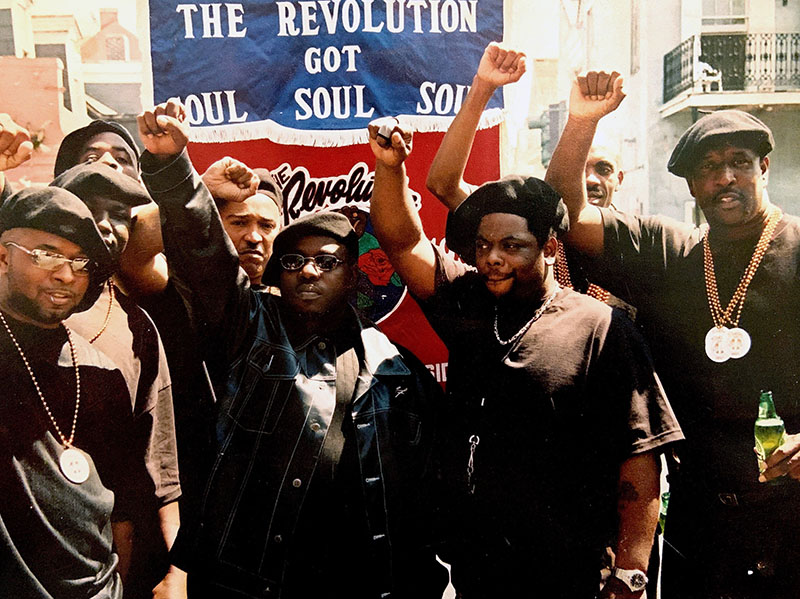
On one of their anniversary years, the Buckjumpers paid for five hours. Once they paid for five, I knew we could as well. Ever since that, I’ve paid for the extra hour, so we’re not rushed. When we leave Armstrong Park, we go all the way up to Dryades Street by my dad’s mother’s house, across from the Y in the Third Ward, to change clothes.
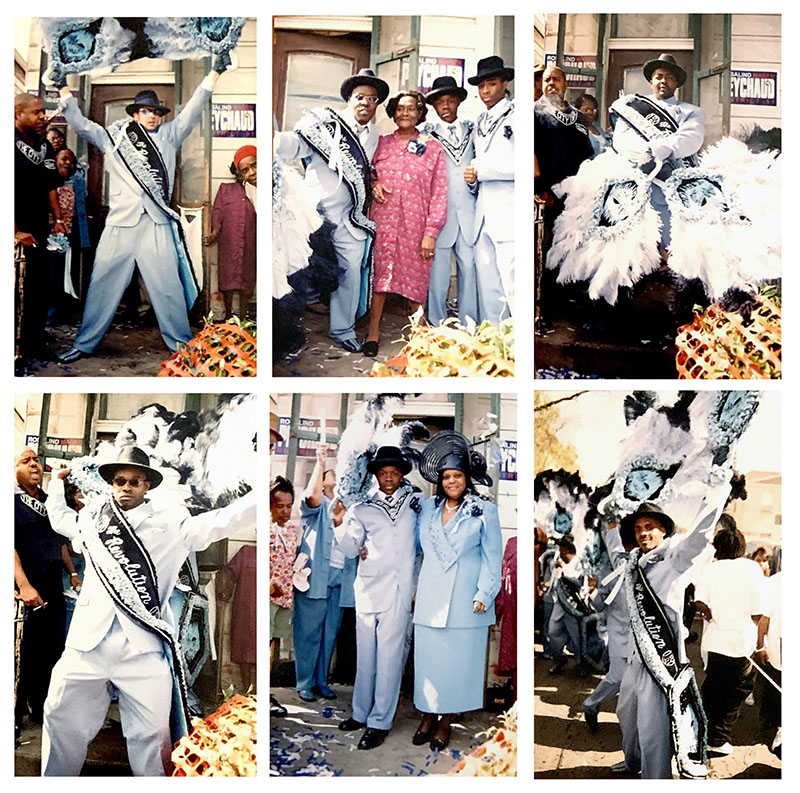
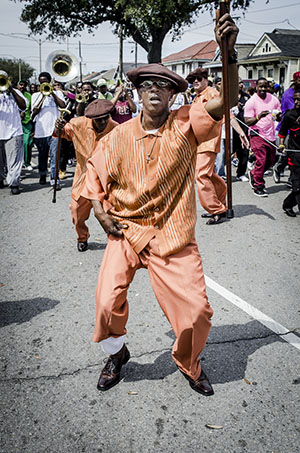
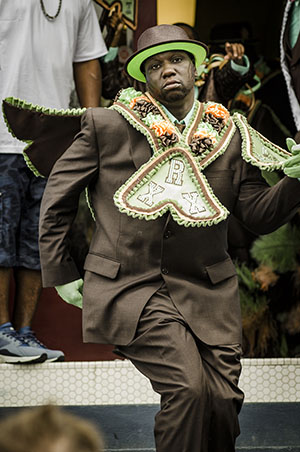
For years, we disband at Kemp’s. My daddy and Kemp were partners. They grew up together in the Third Ward. We did a good 15 years uptown. In 2004, we were getting together for a parade and, I stepped outside. When I came back in, some of the club members were fussing. I said, “What’s the fuss about?” They wanted a different band. We wanted to stay with Rebirth, and they wanted the Hot 8. We went at it. A bunch of them, maybe about 12 people, decided to leave, including Disco. They went and founded Keep’N It Real. His younger brother, Theris “Butt” Valdery, stayed with me.
After Katrina, the YMCA bought the house my grandmother used to stay in, and her daughter took her to Kenner. We took the parade a lot of other places around the city. Once we started coming downtown, we stayed downtown in the Sixth and Seventh Wards.
I’ve been running the club for 26 years. Each year, I didn’t want nobody to feel like I’m going to do everything and they ain’t got to do nothing. Every year, I appointed people to a job. That’s what keeps it fair. I tell my members, “Everybody can be part of this, and then now you can feel better about yourself.”
Wardell Lewis is still who does all my King and Queen’s designs. He puts himself into it, takes his time, and does an outstanding job that you’ll appreciate. One year, Action Jackson was our king. He used to DJ at Seal’s Class Act, and we got tight. He pulled off a good act for us. We pick four women to be in the court: First Maid, Second Maid, Third Maid and the Fourth Maid. They’re going to be with me for at least four years, and they’ll work their way up to the Queen. Once you know you’re a maid, you know your queen year. You can work towards that and move forward; it’s fair.
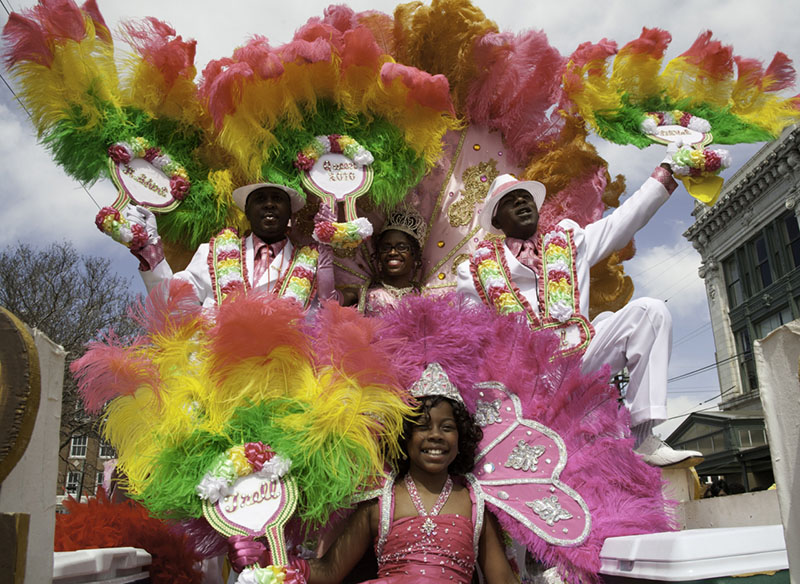
We’re the fourth Sunday in March. In 2020, the city cancelled The Single Man and then they cancelled us before the whole season shut down. When we can parade again, I’m taking the Revolution downtown. The Ninth Ward is safer than it used to be. Nine Times been parading, and across the canal you have the Big Nine and C.T.C. Everybody has great fun, so I think it’s time to go home.
I had this stroke in 2013, and I’m slowly being able to come out more again. But Disco, man, he’s still at it. He ain’t been parading the last couple of years; but he’s going to ride this year as the king in our parade with all of us who come up together. All of us who used to go to the Glass House and run to every second line.

